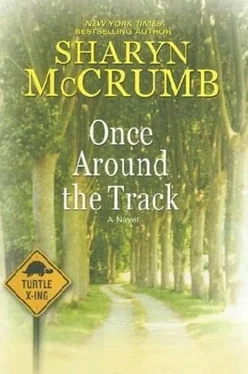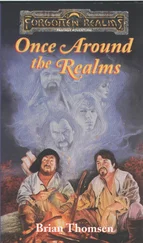“Well, you have to have them anyhow. Shop jobs may take skill and experience, but anyone reasonably spry and willing can be taught to serve on the pit crew. We’ll just hire the people who are willing to do both jobs at a salary we can afford to pay. That suit you?”
They nodded, looking relieved that she was looking out for the team’s budget. It had been quite a shock to most of them to learn how expensive Cup racing was. A million dollars for a crew chief? More than twenty-five thousand dollars per race for tires ? No wonder sponsorships were so expensive.
“What about equipment?” said Tuggle. “I take it we’re not building the cars from scratch?”
“I got some advice about that,” Christine Berenson said. “We’re going to buy the chassis from…Oh, what is his name? I have it written down somewhere…”
“Never mind,” said Tuggle. Four guesses would have told her what the name was, but it really didn’t matter at this point. “And you’re getting the engines from Hendrick?”
“However did you know? I believe that was the name.”
Tuggle nodded. It had been an educated guess. Hendrick was a five-car race team with about 500 shop dogs at their disposal. If anybody could spare adequate engines for a price, it would be them.
“All right,” said Tuggle, “so we buy the components and get our people to overhaul them. That ought to work.” It won’t win you a championship, she was thinking, but with reasonable skill on the engineers’ part and a halfway decent wheel man, it ought to keep you in the game.
“And you’ve had your application cleared by NASCAR? Got assigned a number and all?”
They nodded. “Apparently you can’t pick your own number,” one of them remarked.
“Well, no. Teams are assigned numbers. Some of them not in use are still already taken,” Tuggle explained.
“We wanted number 7.”
“Taken,” said Tuggle. “Both 7 and 07; both. Why did you want it in particular?”
They glanced at each other uneasily. “Well, there’s a feminine product, Monistat 7 for yeast infections, and we thought-”
Tuggle’s eyes glazed over as she tried to picture Badger Jenkins as the spokesperson for a yeast infection product. He’d have to carry pepper spray to the drivers’ meetings. Thank God that number was taken by Robby Gordon, who already had a sponsor. She’d have paid money to see Robby Gordon’s face if the yeast infection people had approached him about sponsoring his car.
“Twenty-eight would have been a good number, too!” said Diane Hodges, the former Miss Texas. “I think that pharmaceutical company with the birth control pill would have come on board if we could have got that number.”
“That was Davey Allison’s number,” said Tuggle. “And Ernie Irvan’s.” Both Daytona 500 winners: one of them dead and the other so badly injured he’d never race again. No, you wouldn’t see the number 28 back on a NASCAR track anytime soon, and she was glad of it. She wouldn’t want to see anything disrespectful done with that number. She didn’t want to jinx Badger, either. Repressing a shudder, she said, “So what’s our number?”
Christine Berenson said, “NASCAR assigned us the number 86.”
Tuggle tried not to wince. Not an auspicious number in Cup racing. It had been used fewer than a dozen times in the past thirty years, and never with any notable success.
“Isn’t 86 a slang term for terminating something?” asked one of the women.
“Maybe they want to eighty-six a woman’s team,” another one said.
“It’s just a number,” said Christine, with the weary patience of one who has had this discussion often. “Randomly assigned, I expect.”
“It’s okay,” said Tuggle. “It’s as good a number as any. Better than some. At least it’s not a number whose past would overshadow you, like…oh…22.” 22. Now that was a number to conjure with. The legendary Fireball Roberts, who had died after a fiery wreck at Charlotte in the sixties; country singer Marty Robbins, who used to try to come in second because he didn’t need the prize money; the respected and popular modern drivers Ricky Rudd and Bobby Labonte; and Daytona 500 winners Bobby Allison and Ward Burton. They all had driven the 22. She’d hate to have to compete with that reputation in her first season. At least it wouldn’t take much to eighty-six the previous reputation of number 86. She said, “So if you’ve got enough money to buy engines and chassis, you must have a primary sponsor lined up.”
“We do. A pharmaceutical company has developed a pill for women-you know, like Viagra. It’s supposed to-”
“I know what Viagra does,” said Tuggle, hoping to forestall the lecture. “For women, huh? What’s this one called?”
“Vagenya.”
“Virginia?”
Christine smiled. “Yes, it does sound like the way Southerners pronounce the name of the state, doesn’t it? Actually, I think the makers may have been playing with the words ‘virginity’ and ‘vagina,’ but who knows where they come up with these peculiar names for drugs nowadays? Anyhow, since it is a women’s team, the company decided that we would be a good place to advertise their product. So our sponsor is Vagenya, and our colors are royal purple and white.”
“Um…purple,” said Tuggle, trying to think of something to say other than what she was thinking, which was that if they decked Badger out in a purple firesuit with a Vagenya logo on it, he was probably going to have to beat people up in the drivers’ meeting to stop the catcalls. “There’s a brand of synthetic oil called Royal Purple. You might see if they’re interested in being a secondary sponsor.”
“Thank you,” said Christine, making a note of the name. “That’s exactly the sort of thing we need to know. As inexperienced as we are, I think we were very fortunate to get the makers of Vagenya to sponsor the car.”
“Of course, it helps that Eugenia’s father is the CEO of the company,” said Diane Hodges with a wink and a grin.
Tuggle stared at the circle of satisfied smiles. They were pleased. They were smug. They had managed to snag a twenty-million-dollar sponsor for their new Cup team. Weren’t they clever? Tuggle was thinking, Oh…my…God… She pictured drivers meetings. Fan sites on the Internet. Press interviews. But most of all she pictured having to be the one who tried to explain to Badger Jenkins what Vagenya was.
“And we can get free samples if you want some,” said one of the investors happily.
Tuggle summoned a queasy smile . Great, she thought, maybe I can swap it to Bobby Labonte for some of his Wellbutrin.
Later that afternoon, Tuggle sat on the polyester bedspread in her room in the Mooresville Best Western and tried to figure out what had just happened. She had taken the job. She had just accepted responsibility for a multimillion dollar operation and a temperamental race car driver, all funded by a sponsor that she still couldn’t mention with a straight face. There must be easier ways to make a living. Nothing she’d rather do that would pay a tenth of the salary, though, come to think of it.
Now she’d have to see about finding a place to live nearer to Mooresville, and then she’d have to begin the process of building a team she could work with. Well, she wasn’t in the market for a Lake Norman McMansion, that was for sure. Lake Norman was the Beverly Hills of NASCAR: a community of upscale homes on a man-made lake north of Charlotte. Oh, they paid some drivers well enough-though merchandising and commercial ventures counted for more of their income than winnings-but compared to the lords of the wheel, crew chiefs as a rule didn’t get obscenely rich in this sport. But if they didn’t try to outspend the drivers, they earned enough to be set for life.
Читать дальше












